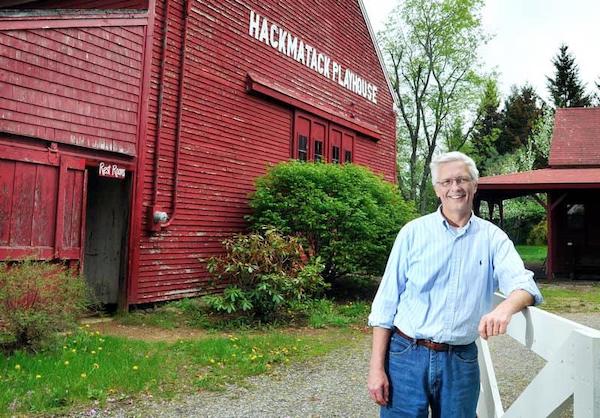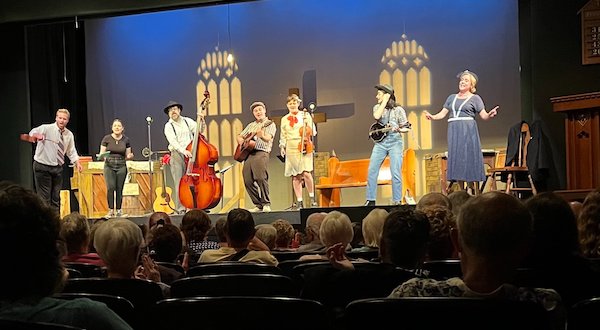Theater Commentary: Maine’s Hackmatack Playhouse — After 50 Years, a Fond Adieu
By David Greenham
When Hackmatack Playhouse closes, that will leave, by my count, just one nonequity, professional summer resident theater in Maine: Acadia Rep (founded in 1973) located in Somesville, near Bar Harbor.
Smoke on the Mountain, conceived by Alan Bailey. Book by Connie Ray. Directed by Jeff Seabaugh. Musical direction by Emily Zentis. Costume design by Fran Bechtold. Lighting design by Tayva Young. Set design by Jeff Seabaugh. Produced by Hackmatack Playhouse, Berwick, ME, through August 20.

Producer Michael Guptil in front of the soon to be extinct Hackmatack Playhouse. Photo: Facebook
If you love New England theater history or even old movie musicals, you’re likely familiar with the famous Straw Hat Circuit. In the ’30s and ’40s, extending into the last half of the 20th century, stars of stage and screen were featured in productions of plays and musicals across a network of summer theaters for one-week engagements. A 1947 map of the Straw Hit Circuit lists nearly 30 theaters dotting the northern New England landscape.
The Straw Hat featured famous actors in lead roles, often with a supporting cast of professionals, barnstorming from theater to theater. You can still hear tales of Frederic March, Ethel Barrymore, Tallulah Bankhead, and hundreds of others who trod the boards in theaters such as the Cape Playhouse in Dennis, the Peterborough Players, and the Ogunquit Playhouse. As mass entertainment choices broadened, the circuit celebs shifted to TV stars like Don Knotts, Barbara Eden, and even John Travolta in his Welcome Back Kotter days. (You guessed it, he toured with a production of William Inge’s Bus Stop.) The success of the Straw Hat circuit inspired imitations throughout the New England countryside. Summer resident theaters sprouted up in communities large and small. These union and nonunion companies often featured “future” stars who were a less costly alternative to the major circuit.
In 1972, in the tiny Maine town of Berwick, farmer Carlton Guptil decided to transform a cow barn on his 17th-century family farm into a (nonunion) Straw Hat stage. The first summer at the Hackmatack Playhouse featured productions of the show 10 Nights in a Barroom, Harvey, The Fantasticks, Wait Until Dark, and You’re A Good Man Charlie Brown. Each show ran for two weekends, and tickets were $3 apiece.
Hackmatack will close its 50th anniversary season next week following the final performance of Smoke on the Mountain, this summer’s single offering. The show marks the final season for the plucky company. By my count, that will leave just one nonequity, professional summer resident theater in Maine, Acadia Rep (founded in 1973) located in Somesville, near Bar Harbor.
A visit to Hackmatack is like stepping back in time. It is a throwback to the Judy Garland/Mickey Rooney up and at’ em setup, including a barn theater, concession stand, and box office. A few assorted buildings sit adjacent to the barn, housing the scene and costume shops. Stored props, sets, and costumes fill every nook and cranny. If the theater is in your blood, the place is heaven lit by footlights.

A scene from Smoke on the Mountain, the final production in Hackmatack’s last season. Photo: Facebook
But, as Bob Dylan observed, “the times, they are a-changin,” and producer Michael Guptil, Carlton’s son, has seen the economic and cultural writing on the wall. “Actors still want to work, and they love the experience of it. But the audience is aging, and there are so many other ways to spend your time and you don’t ever have to leave the couch,” he laments. Guptil, who works full time as a produce broker in Boston, has been defeated by the increasingly depressing truth of what it takes to put on live entertainment: “Despite the fact that it’s the theater’s 50th year, the prep requires the same effort, every time.”
Smoke on the Mountain wasn’t the first choice for Hackmatack’s last season. Rights to two other shows were pulled — a reality of the “businesses” of show.
Alan Bailey and Connie Ray’s tuneful, but thin, Smoke on the Mountain somehow fits as an elegiac capstone. Like the stage, the musical is a relic of days gone by, though, unlike Hackmatack, the musical is not an authentic piece of the past. The bluegrass and gospel musical was initially workshopped at Princeton’s McCarter Theater in the late ’80s and has since become a popular summer selection for theaters across the country, especially in the South.
Set in 1938 at the imaginary Mt. Pleasant Baptist Church in the Smoky Mountains of North Carolina, the show begins with the quirky pastor Marvin Oglethorpe (Evan Stechauner) welcoming the congregation to the house of worship’s first Saturday Night Songfest. The evening’s featured singers will be the Saunders Family, reuniting after five years away from the gospel circuit. The family includes the father, Burl (Billy Butler), mother, Vera (Emily Zentis), and twin children Dennis (Stephen Blauch), and Denise (Jules Good). They’re joined by Burl’s brother Stanley (Jacob J. Zentis), and Vera’s sister June (Linette Miles — in most productions, June is Burl and Vera’s older daughter). The Hackmatack Playhouse production brings in an additional performer, Cousin Judd (a mandolin playing actor named Fury who does not speak in the show).
The production is enjoyable; the few a cappella numbers are the musical standouts. Jacob J. Zentis, as the bedeviled brother, Stanley, delivers a story and song in the second act that noticeably lifts the production to another level.

In Maine, a sign of the times. Photo: David Greenham
But it’s the neighborly ambiance that steals the show. The crew of volunteers is friendly and welcoming and audience members exude an obvious love for the place that is only tangentially connected with what’s on stage. The curtain may be descending on Hackmatack, but Michael Guptil is filled with enthusiasm. He greets each visitor as an old chum. His wife Gayle still bakes 35 pies a week to satisfy the hungry crowds at intermission and the pastry is served with a scoop of homemade ice cream from their daughter Lauren Guptil’s popular Kennebunkport sweet shop, Rococo.
“It was always so nice to be baking and have the windows open to hear the chorus rehearsing,” Gayle recalls. The closing of the family business is “bittersweet, but also quite beautiful,” adds Laura. “I grew up with a musical theater in my backyard. I mean, who does that?”
In an age of young artists saddled with college debt, there is an increased need for livable wages to replace the old $100 a week plus room and board type of contracts. We are making important moves toward a future in which more theater artists will make a living plying their craft. Though the upshot may be less theater fare to choose from.
But it’s important to take a moment and honor the passing of an era when summer stock meant five productions in 10 weeks. Yes, it was an impossible schedule, but there were opportunities aplenty to receive invaluable on-the-job training and live through indelible “war” stories. For the performers, crew, and support staff who could take the heat and the pressure, the experience was in some cases life-changing: friendships were made, romances blossomed, and memorable experiences were had. “People thought I was just working in the concession stand as a kid,” Lauren Guptil says, “but I was learning about sales and customer service, and how to be nice to people. I’m very lucky.”
Local audiences were lucky to have places to gather like the Hackmatack Playhouse. As they depart, we are losing a sense of community that, in an age of isolation and social media, isn’t coming back.
David Greenham is an adjunct lecturer of Drama at the University of Maine at Augusta, and is the executive director of the Maine Arts Commission. He has been a theater artist and arts administrator in Maine for more than 30 years.
Tagged: David Greenham, Hackmatack Playhouse, Michael Guptil, Smoke on the Mountain

Loved the place.